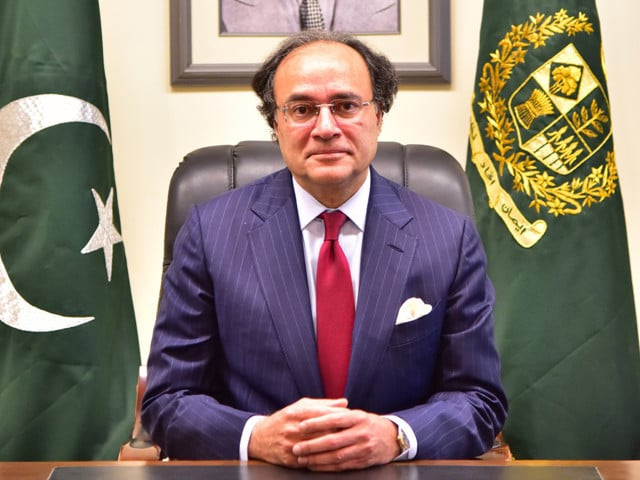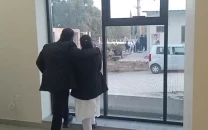PM clips finance minister’s decision-making wings
Aurangzeb deprived of chairmanships of ECC, CCOP

In a significant move, Prime Minister Shehbaz Sharif has reshuffled key positions within the cabinet, depriving Finance Minister Muhammad Aurangzeb of chairmanships in two pivotal committees while carving out a major role for Foreign Minister Ishaq Dar in financial matters.
The premier has reconstituted four cabinet committees. Out of these, Finance Minister Aurangzeb has been appointed as the chairman of only one committee – a departure from past practices where finance ministers typically chaired three out of the four committees.
The cabinet division has notified the reconstitution of the new committees.
Pakistan also officially acknowledged that the CPEC was moving slowly and has made the re-engagement of the Chinese companies as part of the terms of references of the newly reconstituted committee on Chinese investment.
PM Shehbaz has retained the chairmanship of the most important Economic Coordination Committee (ECC) of the cabinet instead of making Muhammad Aurangzeb head of it. However, in the absence of the prime minister, the finance minister would chair the ECC meeting.
The arrangement suggests that there was resistance to giving the ECC’s chairmanship to the finance minister, a PML-N insider told The Express Tribune.
In another significant development, the prime minister has appointed Foreign Minister Ishaq Dar as the chairman of the Cabinet Committee on Privatisation (CCOP) – a position previously held by the finance minister before the Pakistan Democratic Movement government.
During the caretaker setup, former finance minister Dr Shamshad Akhtar initially assumed the role of CCOP chairperson, which was later transferred to Privatisation Minister Fawad Hasan Fawad.
Sources informed The Express Tribune that within the PML-N, there were differing opinions regarding the appointment of a new finance minister in place of Dar during the government formation period. Ultimately, it was decided that Dar would retain involvement in economic affairs, albeit in a different capacity.
Finance Minister Muhammad Aurangzeb would chair only the cabinet committee on State-owned Enterprises (CCoSOEs). The prime minister also made Ahsan Iqbal, the planning minister, as the chairman of the Cabinet Committee on the Chinese Investment Projects.
Shehbaz Sharif’s decision to deprive the finance minister of the chairmanship of the ECC may limit his control over economic matters due to the wide range of decisions that the ECC takes and their implications on the budget.
When contacted, Finance Minister Aurangzeb said that “PM is taking full ownership of driving the economic agenda, which is the right thing to do”.
Earlier, the cabinet division had issued a notification, mentioning Revenue as an “additional portfolio” of Muhammad Aurangzeb. But Aurangzeb said last week that he would be permanently looking after the Revenue portfolio and it was just that the notification was not properly issued.
The members of the reconstituted ECC include the finance minister, the economic affairs minister, the commerce minister, the minister for petroleum and the minister for planning. There are 18 co-opted ECC members including the deputy chairman of the planning commission, the governor State Bank of Pakistan (SBP), the chairman securities and exchange commission and the chairman board of investment.
The PM has not made the industries minister and maritime affairs minister members of the ECC.
The ECC has been empowered to consider all urgent economic matters and to coordinate economic policies. It would also maintain vigilance on the monetary and credit indicators. It has also authorised the future pattern of growth of agriculture and industries but the industries minister is not a member of the ECC.
The ECC has been mandated to review import policy, and export performance watch the current price situation and ensure price stability. The ECC can make decisions about oil and gas exploration and will oversee the performance of the autonomous bodies.
The Prime Minister had earlier handed over the responsibility of the outsourcing of the three international airports to Ishaq Dar, although this transaction was not carried out under the Privatisation law.
But according to a new notification, now Minister for Defense and Aviation Khawaja Asif will be the chairman of the cabinet committee on the outsourcing of airports and privatisation of Pakistan International Airlines. Ishaq Dar is made the member of this committee, which will now get the secretariat support from the Aviation Division.
CCOP
Ishaq Dar, as chairman of CCOP, will also have vast powers on the privatisation matters and some of the functions of the CCOP also overlap with the functions of the CCoSOEs, which is headed by the finance minister.
The CCOP will formulate the privatisation policy and it will approve the SOEs for the privatisation. The CCOP will take policy decisions on inter-ministerial issues relating to the privatisation process and it will also monitor their progress.
The CCOP will take policy decisions on matters pertaining to privatisation, restructuring, deregulation, regulatory bodies and the privatisation fund account. It will be empowered to approve the reference price for the sale of the SOEs.
The Minister for Finance, Minister for Commerce, Minister for Power, Minister for Industries and Minister for Privatisation will be the members of the CCOP.
CCoSOEs
Muhammad Aurangzeb will chair the cabinet committee on SOEs, which will enforce and monitor the implementation of the SOEs Act and other related laws and policies, according to the cabinet division notification.
The committee will also have the mandate to make appointments on the board of the SOEs and formulate the reform and restructuring proposals. It will also take a periodical review of the financial and operational performance of the SOEs.
The minister for maritime affairs, minister for economic affairs, minister for science and technology and minister for housing & works will be the members of the cabinet committee on SOEs.
CCoCIP
The prime minister has appointed Planning Minister Ahsan Iqbal as the chairman of the cabinet committee on Chinese Investment Projects. His immediate challenge in hand will be to resolve the issue of delayed payments of over Rs515 billion to the Chinese power plants.
Foreign Minister Ishaq Dar will also be a member of the CCoCIP. Among other members are Minister for Interior, Minister for Finance, Minister for Commerce, Minister for Petroleum, Minister for Power, Minister for Railways and Minister for Science and Technology.
According to the cabinet division’s notification, the committee will oversee the progress of the investment projects executed by the Chinese investors and it will expeditiously resolve issues faced by the Chinese investors with different government entities. The committee will also facilitate Chinese investment in productive sectors of the economy as the next phase of CPEC.
While acknowledging that the CPEC was moving at a snail’s pace, the PM has mandated the committee to “reactive slow-moving projects of CPEC through re-engagements with nominated Chinese entities”. It will also review measures taken for the security of the Chinese working and living in Pakistan.



















COMMENTS
Comments are moderated and generally will be posted if they are on-topic and not abusive.
For more information, please see our Comments FAQ